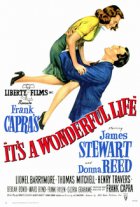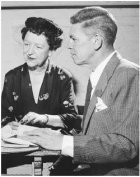
It's a Wonderful Life Page #6
- PG
- Year:
- 1946
- 130 min
- 2,444 Views
CLOSEUP �� Mary, still staring at George, and smiling.
FREDDIE'S VOICE (cont'd)
. . . but I couldn't find out. Nobody'd ever tell you whoever it
was because they'd be scared. They know . . .
MEDIUM CLOSEUP �� Mary and Freddie. Marty comes into scene,
followed by George.
FREDDIE (cont'd)
. . . what kind of . . .
MARTY (interrupting)
You remember George? This is Mary. Well, I'll be seeing you.
GEORGE:
Well . . . Well . . . Well . . .
FREDDIE:
Now, to get back to my story, see . . .
Mary hands her punch cup to Freddie, and she and George start
dancing.
FREDDIE (cont'd)
Hey, this is my dance!
GEORGE:
Oh, why don't you stop annoying people?
FREDDIE:
Well, I'm sorry. Hey!
MOVING SHOT �� following George and Mary as they dance.
GEORGE:
Well, hello.
MARY:
Hello. You look at me as if you didn't know me.
GEORGE:
Well, I don't.
MARY:
You've passed me on the street almost every day.
GEORGE:
Me?
MARY:
Uh-huh.
GEORGE:
Uh-uh. That was a little girl named Mary Hatch. That wasn't you.
A WHISTLE is heard offscreen, and the MUSIC stops.
CLOSE SHOT �� Harry on the orchestra platform, whistle in hand.
HARRY:
Oyez �� oyez �� oyez . . . The big Charleston contest. The prize?
A genuine loving cup. Those not tapped by the judges will remain
on the floor. Let's
go!
CLOSEUP �� George and Mary. As the MUSIC starts and couples begin
dancing once more, they look at each other.
GEORGE:
I'm not very good at this.
MARY:
Neither am I.
GEORGE:
Okay �� what can we lose?
They start their Charleston. We see a SERIES OF SHOTS of various
couples doing their routines, some good, some bad.
CLOSEUP �� Freddie leaning against the railing around the dance
floor, looking daggers at George. Mickey, a young punk who has
had one too many,
is beside him.
MICKEY:
What's the matter, Othello �� jealous? Did you know there's a
swimming pool under this floor? And did you know that button
behind you causes this
floor to open up? And did you further know that George Bailey is
dancing right over that crack? And I've got the key?
Freddie needs no more. He takes the key from Mickey and turns the
switch. The floor begins to part in the middle, each half sliding
under the bleacher
seats. Pandemonium starts. Dancers begin to scream as they try to
get off. Some are so engrossed in dancing they continue at top
speed. Teachers and
elders start to scurry off. As the floor opens, it reveals an
attractive, lighted swimming pool.
George and Mary are so busy dancing they don't notice the floor
opening. Spotlights concentrate on them. They mistake the screams
for cheers.
CLOSE SHOT �� George and Mary dancing.
GEORGE:
They're cheering us. We must be good.
MEDIUM CLOSE SHOT �� the crowd watching George and Mary dancing.
They move backwards until finally they reach the edge of the
floor and fall
into the pool below.
SERIES OF SHOTS �� George and Mary still trying to dance in the
water �� the crowd on the edge cheering them �� some of the crowd
leap into the
pool �� the principal trying to restore order, finally clasps his
hands like a diver and leaps in himself.
FADE OUT:
George and Mary's moonlight walk
FADE IN:
EXTERIOR TREE-LINED RESIDENTIAL STREET �� NIGHT
MEDIUM CLOSE SHOT �� George and Mary. The night is warm with a
bright moon. George is dressed in jersey sweater and oversize
football pants
that keep wanting to come down. Mary is in an old white bath
robe. Each is carrying their wet clothes tied into a bundle that
leaves a trail of dripping
water. As they near the camera we hear them singing:
GEORGE AND MARY (singing)
Buffalo Gals can't you come out tonight. Can't you come out
tonight. Can't you come out tonight. Buffalo Gals can't you come
out tonight and dance by the light of the moon.
GEORGE:
Hot dog! Just like an organ.
MARY:
Beautiful.
CAMERA MOVES WITH them as they proceed down the street.
GEORGE:
And I told Harry I thought I'd be bored to death. You should have
seen the commotion in that locker room. I had to knock down three
people to get
this stuff we're wearing here. Here, let me hold that old wet
dress of yours.
He takes the bundle of clothes from Mary. They stop and look at
each other.
MARY:
Do I look as funny as you do?
GEORGE:
I guess I'm not quite the football type. You . . . look
wonderful. You know, if it wasn't me talking I'd say you were the
prettiest girl in town.
MARY:
Well, why don't you say it?
GEORGE:
I don't know. Maybe I will say it. How old are you anyway?
MARY:
Eighteen.
GEORGE:
Eighteen? Why, it was only last year you were seventeen.
MARY:
Too young or too old?
GEORGE:
Oh, no. Just right. Your age fits you. Yes, sir, you look a
little older without your clothes on.
Mary stops. George, to cover his embarrassment, talks quickly on:
GEORGE:
I mean, without a dress. You look older . . . I mean, younger.
You look just . . .
In his confusion George steps on the end of the belt of Mary's
bath robe, which is trailing along behind her. She gathers the
robe around her.
GEORGE:
Oh-oh . . .
MARY (holding out her hand)
Sir, my train, please.
GEORGE:
A pox upon me for a clumsy lout.
He picks up the belt and throws it over her arm.
GEORGE:
Your . . . your caboose, my lady.
MARY:
You may kiss my hand.
GEORGE:
Ummmmm . . .
Holding her hand, George moves in closer to Mary.
GEORGE (cont'd)
Hey �� hey, Mary.
Mary turns away from him, singing "Buffalo Gals":
MARY (singing)
As I was lumbering down the street . . .
George looks after her; then picks up a rock from the street.
GEORGE:
Okay, then, I'll throw a rock at the old Granville house.
MARY:
Oh, no, don't. I love that old house.
MEDIUM LONG SHOT �� old house. It is a weather-beaten, old-
fashioned two-storied house that once was no doubt resplendent.
GEORGE:
No. You see, you make a wish and then try and break some glass.
You got to be a pretty good shot nowadays, too.
MEDIUM CLOSEUP �� George and Mary.
MARY:
Oh, no, George, don't. It's full of romance, that old place. I'd
like to live in it.
GEORGE:
In that place?
MARY:
Uh-huh.
GEORGE:
I wouldn't live in it as a ghost. Now watch . . . right on the
second floor there.
MEDIUM LONG SHOT �� old house. George hurls the rock at the
house. We hear the SOUND of a window breaking.
EXTERIOR FRONT PORCH OF HOUSE �� Night
CLOSE SHOT �� We see a grumpy old man in shirt sleeves in a
rocking chair on the porch. He looks up as he hears the breaking
glass.
EXTERIOR STREET �� NIGHT
CLOSEUP �� George and Mary.
MARY:
What'd you wish, George?
GEORGE:
Well, not just one wish. A whole hatful, Mary. I know what I'm
going to do tomorrow and the next day and the next year and the
year after that. I'm
shaking the dust of this crummy little town off my feet and I'm
going to see the world. Italy, Greece, the Parthenon, the
Colosseum. Then I'm coming back here and
go to college and see what they know . . . and then I'm going to
build things. I'm gonna build air fields. I'm gonna build
skyscrapers a hundred stories high. I'm gonna
build bridges a mile long . . .
Translation
Translate and read this script in other languages:
Select another language:
- - Select -
- 简体中文 (Chinese - Simplified)
- 繁體中文 (Chinese - Traditional)
- Español (Spanish)
- Esperanto (Esperanto)
- 日本語 (Japanese)
- Português (Portuguese)
- Deutsch (German)
- العربية (Arabic)
- Français (French)
- Русский (Russian)
- ಕನ್ನಡ (Kannada)
- 한국어 (Korean)
- עברית (Hebrew)
- Gaeilge (Irish)
- Українська (Ukrainian)
- اردو (Urdu)
- Magyar (Hungarian)
- मानक हिन्दी (Hindi)
- Indonesia (Indonesian)
- Italiano (Italian)
- தமிழ் (Tamil)
- Türkçe (Turkish)
- తెలుగు (Telugu)
- ภาษาไทย (Thai)
- Tiếng Việt (Vietnamese)
- Čeština (Czech)
- Polski (Polish)
- Bahasa Indonesia (Indonesian)
- Românește (Romanian)
- Nederlands (Dutch)
- Ελληνικά (Greek)
- Latinum (Latin)
- Svenska (Swedish)
- Dansk (Danish)
- Suomi (Finnish)
- فارسی (Persian)
- ייִדיש (Yiddish)
- հայերեն (Armenian)
- Norsk (Norwegian)
- English (English)
Citation
Use the citation below to add this screenplay to your bibliography:
Style:MLAChicagoAPA
"It's a Wonderful Life" Scripts.com. STANDS4 LLC, 2025. Web. 23 Feb. 2025. <https://www.scripts.com/script/it's_a_wonderful_life_872>.







Discuss this script with the community:
Report Comment
We're doing our best to make sure our content is useful, accurate and safe.
If by any chance you spot an inappropriate comment while navigating through our website please use this form to let us know, and we'll take care of it shortly.
Attachment
You need to be logged in to favorite.
Log In